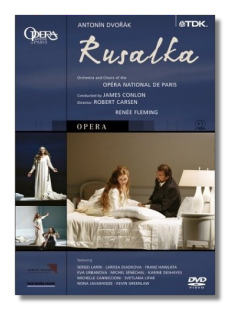
The Internet's Premier Classical Music Source
Related Links
- Dvořák Reviews
- Latest Reviews
- More Reviews
-
By Composer
-
Collections
DVD & Blu-ray
Books
Concert Reviews
Articles/Interviews
Software
Audio
Search Amazon
Recommended Links
Site News
 DVD Review
DVD Review
Antonín Dvořák

Rusalka
- Renée Fleming (Rusalka)
- Sergei Larin (The Prince)
- Franz Hawlata (The Water Spirit)
- Larissa Diadkova (Ježibaba)
- Eva Urbanová (The Foreign Princess)
- Michel Sénéchal (The Gamekeeper)
- Karen Deshayes (The Kitchen Boy)
- Michelle Canniccioni, Svetlana Lifar, Nona Javakhidze (Wood Nymphs)
- Kevin Greenlaw (Voice of a Huntsman)
Orchestra and Choirs of the Opéra National de Paris/James Conlon
TDK Mediactive DVUS-OPRUS 2DVDs 155 minutes LPCM Stereo Dolby Digital 5.1 DTS 5.1 16:9 Widescreen
Smetana's The Bartered Bride, Janáček's Jenůfa, and Dvořák's Rusalka are the three most famous Czech operas, but that's not saying much outside of their country of origin – they haven't been exported all that often, particularly to the United States. Renée Fleming is an American superstar, of course, but I understand that she has Czech blood running through her veins. Perhaps she'll be the one who popularizes Rusalka on this side of the Atlantic, first through her Decca recording, and now with this DVD release.
This is a production from June 2002, recorded live in Paris from the Bastille. The director was Robert Carsen and the stage and costume designer was Michael Levine. They have chosen not to treat the subject realistically at all, but to explore its symbolism. On the surface, Rusalka is just another variation on the classic fairy tale of the water nymph that falls in love with a human and brings disaster upon herself and on her beloved when she becomes a human. Carsen treats it as a psychological drama about sexuality. The material human world is represented solely by the Prince's white bed, which hangs ominously from the ceiling during the opening scene. (In the same scene, the watery world of the nymphs is represented by a sort of wading pool.) Rusalka's desire for human love is seen as a forbidden desire for sexual fulfillment. The Water Spirit and the witch Ježibaba act as parental figures, trying to preserve their daughter's maidenhead. Rusalka's inability to communicate with and respond to the Prince is presented as a kind of sexual frigidity. Things get more convoluted when she, Ježibaba, and the Foreign Princess all are clothed in an identical costume: a black negligee with an apricot robe. In Act Two, the stage is divided in two, with one half the mirror image of the other – is this "Rusalka Through the Looking-Glass"? In the last act, Ježibaba mocks Rusalka's despair from the Prince's bed (!) which now hangs from the wall (!!). What does it all mean? The opera ends not with the death of Rusalka and the Prince, but with Rusalka's sexual thawing. As the curtain comes down, the two of them are engaged in some distinctly pre-coital activities. No doubt traditionalists were horrified by this production; I wonder what the composer would have thought? Although Carsen's concept doesn't always mesh with the music, let alone Jaroslav Kvapil's libretto, this well acted production is never anything less than thought-provoking. It has more than shock value.
Musically, this production is up to snuff, although the Decca recording is more incisively conducted by Sir Charles Mackerras, and it has a superior Prince in Ben Heppner. (This is a heldentenorish part, and not a very grateful one, and Sergei Larin sounds as if he is straining much of the time.) Urbanová (rather bland) and the very characterful Hawlata are common to the CDs and DVDs. Fleming is a vibrant Rusalka. Other singers have brought a clearer, more girlish tone to her music, particularly to the famous Act One "Song to the Moon," but Fleming's singing is colored with passion, thereby matching Carsen's concept. Among the principals, she is the only one not to have grown up speaking Czech or Russian, so what she does here is quite an achievement. Diadkova is a solid Ježibaba. As usual, Michel Sénéchal brings plenty of character to his amusing comprimario role.
Acts One and Two are on the first DVD; Act Three is on the second. There is no bonus material. Subtitling is in English, French, Spanish, or Italian. Despite the preponderance of a dark stage, the visuals are excellent, and the sound is top-notch.
While not your great-grandfather's Rusalka, this production has much in its favor.
Copyright © 2004, Raymond Tuttle


















